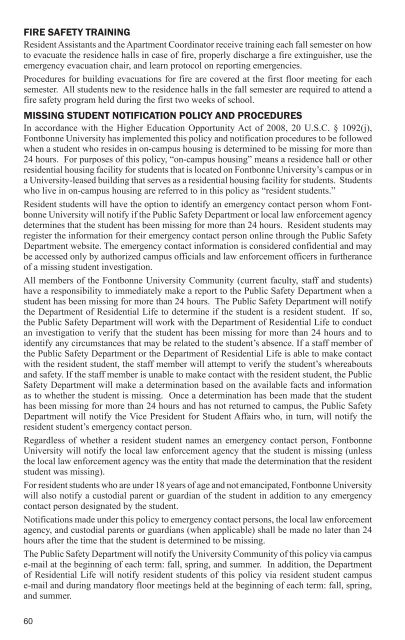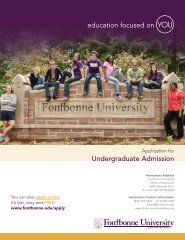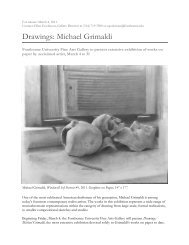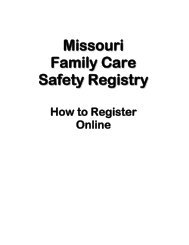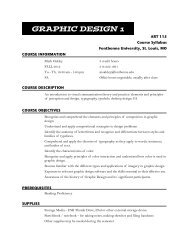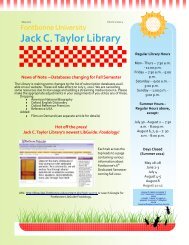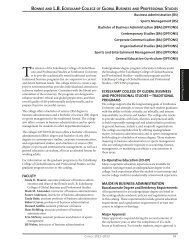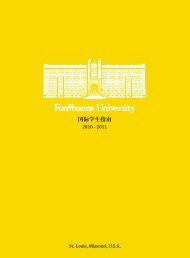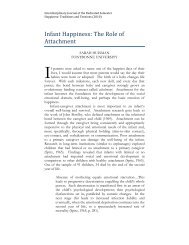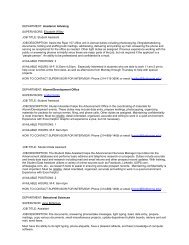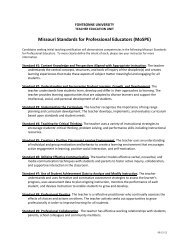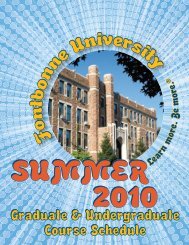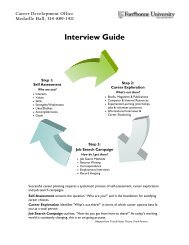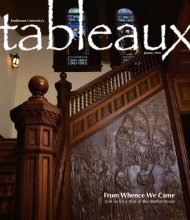Click here (pdf, 891.09KB) - Fontbonne University
Click here (pdf, 891.09KB) - Fontbonne University
Click here (pdf, 891.09KB) - Fontbonne University
You also want an ePaper? Increase the reach of your titles
YUMPU automatically turns print PDFs into web optimized ePapers that Google loves.
Fire sAFety trAininG<br />
Resident Assistants and the Apartment Coordinator receive training each fall semester on how<br />
to evacuate the residence halls in case of fire, properly discharge a fire extinguisher, use the<br />
emergency evacuation chair, and learn protocol on reporting emergencies.<br />
Procedures for building evacuations for fire are covered at the first floor meeting for each<br />
semester. All students new to the residence halls in the fall semester are required to attend a<br />
fire safety program held during the first two weeks of school.<br />
MissinG student notiFiCAtion poliCy And proCedures<br />
In accordance with the Higher Education Opportunity Act of 2008, 20 U.S.C. § 1092(j),<br />
<strong>Fontbonne</strong> <strong>University</strong> has implemented this policy and notification procedures to be followed<br />
when a student who resides in on-campus housing is determined to be missing for more than<br />
24 hours. For purposes of this policy, “on-campus housing” means a residence hall or other<br />
residential housing facility for students that is located on <strong>Fontbonne</strong> <strong>University</strong>’s campus or in<br />
a <strong>University</strong>-leased building that serves as a residential housing facility for students. Students<br />
who live in on-campus housing are referred to in this policy as “resident students.”<br />
Resident students will have the option to identify an emergency contact person whom <strong>Fontbonne</strong><br />
<strong>University</strong> will notify if the Public Safety Department or local law enforcement agency<br />
determines that the student has been missing for more than 24 hours. Resident students may<br />
register the information for their emergency contact person online through the Public Safety<br />
Department website. The emergency contact information is considered confidential and may<br />
be accessed only by authorized campus officials and law enforcement officers in furtherance<br />
of a missing student investigation.<br />
All members of the <strong>Fontbonne</strong> <strong>University</strong> Community (current faculty, staff and students)<br />
have a responsibility to immediately make a report to the Public Safety Department when a<br />
student has been missing for more than 24 hours. The Public Safety Department will notify<br />
the Department of Residential Life to determine if the student is a resident student. If so,<br />
the Public Safety Department will work with the Department of Residential Life to conduct<br />
an investigation to verify that the student has been missing for more than 24 hours and to<br />
identify any circumstances that may be related to the student’s absence. If a staff member of<br />
the Public Safety Department or the Department of Residential Life is able to make contact<br />
with the resident student, the staff member will attempt to verify the student’s w<strong>here</strong>abouts<br />
and safety. If the staff member is unable to make contact with the resident student, the Public<br />
Safety Department will make a determination based on the available facts and information<br />
as to whether the student is missing. Once a determination has been made that the student<br />
has been missing for more than 24 hours and has not returned to campus, the Public Safety<br />
Department will notify the Vice President for Student Affairs who, in turn, will notify the<br />
resident student’s emergency contact person.<br />
Regardless of whether a resident student names an emergency contact person, <strong>Fontbonne</strong><br />
<strong>University</strong> will notify the local law enforcement agency that the student is missing (unless<br />
the local law enforcement agency was the entity that made the determination that the resident<br />
student was missing).<br />
For resident students who are under 18 years of age and not emancipated, <strong>Fontbonne</strong> <strong>University</strong><br />
will also notify a custodial parent or guardian of the student in addition to any emergency<br />
contact person designated by the student.<br />
Notifications made under this policy to emergency contact persons, the local law enforcement<br />
agency, and custodial parents or guardians (when applicable) shall be made no later than 24<br />
hours after the time that the student is determined to be missing.<br />
The Public Safety Department will notify the <strong>University</strong> Community of this policy via campus<br />
e-mail at the beginning of each term: fall, spring, and summer. In addition, the Department<br />
of Residential Life will notify resident students of this policy via resident student campus<br />
e-mail and during mandatory floor meetings held at the beginning of each term: fall, spring,<br />
and summer.<br />
reGulAtions For on And oFF CAMpus sponsored housinG (unless<br />
otherWise speCiFied)<br />
I. Prohibited items and activities<br />
A. Open flame such as candles and incense The use of candles and incense is prohibited<br />
in the residence halls as they constitute a serious fire hazard.<br />
B. Dartboards are not allowed on any wall or door in the living units or hallway.<br />
C. Smoking is not permitted in the residence halls. The buildings are smoke free. Fines<br />
will be assessed for violation of this policy. The base fine for a first violation is $50.<br />
Each subsequent smoking fine is increased by $10 per smoking violation.<br />
D. Waterbeds are not permitted in the residence hall rooms due to the risk of damage in<br />
the event of an accident and the excessive weight of the unit.<br />
E. Hallway sports<br />
II. Restricted items<br />
A. Cooking in Medaille and St. Joseph’s rooms: Closed coil or enclosed cooking elements<br />
such as popcorn poppers, coffee pots, hotpots, and toasters, are some examples of<br />
acceptable cooking appliances. Microwaves no larger than 1.4 cubic feet are allowed<br />
to be used in student rooms. Refrigerators should be no bigger than 2.5 cubic feet. For<br />
questions about the size of an appliance being acceptable please contact the Department<br />
of Residential Life.<br />
B. Extension cords: All extension cords that are used must have the label UL or ETL<br />
approval. This will be on the packaging and the cord itself. Products with this certification<br />
label meet current industry safety standards. If the cords do not have this approval<br />
they cannot be used in the campus sponsored housing.<br />
Guidelines to follow when using an extension cord are:<br />
1. Never keep an extension cord plugged in when not in use. The cord will still conduct<br />
electricity until it is unplugged from the outlet.<br />
2. Do not use extension cords that are cut or damaged.<br />
3. Never cover any part of an extension cord with rugs or other objects while it is in<br />
use.<br />
4. Do not overload cords with too many appliances.<br />
C. Pets: Only fish in a 10-gallon aquarium or smaller are allowed in the residence halls.<br />
Considering public health, safety and the comfort of other residents, all other pets will<br />
be removed at the expense of the resident.<br />
III. <strong>University</strong> Property<br />
A. Commercial purposes: The student’s room shall not be used for commercial purposes.<br />
B. Key usage: Keys are not to be loaned to a non-resident. A $100 fee will be assessed<br />
to the resident assigned that key if this occurs.<br />
C. Locks: The student will not install new locks nor tamper with any lock of the residence<br />
halls or alter or duplicate university keys. Residents found with illegal keys will be<br />
charged a fine of $100 and the cost of a lock change.<br />
D. Misuse of university property: Misuse of university property, including, but not limited<br />
to elevators, fire alarms, smoke detectors, fire equipment, furniture and cable, is subject<br />
to civil court action as well as university sanctions. <strong>University</strong> furniture is not to be<br />
moved from public areas, such as lounges into resident rooms. Window screens must<br />
not be removed and are to remain securely in place at all times.<br />
E. Propping doors open: A fine of $100 will be assessed if you are found propping open<br />
exterior and interior hallway doors to the residence halls.<br />
F. Subleasing: The student’s room shall not be sublet or assigned to anyone else by the<br />
student.<br />
G. Door tampering<br />
60 61


